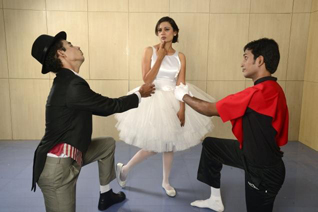Random thoughts on local flavour at Fest

From How to Skin a Giraffe.
How to SKIN a Giraffe (inspired by Georg Büchner’s Leonce und Lena), directed by Rajiv Krishnan, presented by Perch of Chennai and Rafiki of Bangalore.
For a minute, it feels like you’ve pulled an Alice-like stunt and tumbled into another universe... a zany, Dr. Seuss-like one. A myriad mix of languages dart about on stage, reflecting, in a sense, the audience right there in the theatre....Tamil, Hindi, Malayalam, Kannada, to name a few, with English strictly of the ‘we-are-like-this-only’ kind, always a delight to the ear.
The story unfolding on stage has a comfortably familiar air about it. You have two ‘enterprises’ – one a kingdom ruled over by a king who, while endearingly limited in vision, believes wholeheartedly in the myth of his own intellectual enlightenment. As a measure of this superiority, a stream of words, all ending with ‘ion’, tumble out of him. “Predestination of creation; Automation of emotion; Moronic deforestation, oral diarrheaification!” Stream-of-consciousness meets crazy-roller-coaster... yet, a few contemporary digs slip slyly in: “Deception by election! Gender equalisation molestation discrimination... nothing, nothing moves without bribification.”
Fawned over by his coterie of ‘yes-sayers’, who rush to clear his path of obstacles, King Labadub is blissfully unaware that he is basically walking the same road always...getting nowhere quickly, inexorably, with their help. A victim of his own social status, he is willing to stoop to lies when it suits him.
Then you have Heroine Pipi in – what else? – a tower filled with that wistful longing so typical of heroines everywhere, as they cling desperately to daydreams even though something within warns otherwise. A life, where she will merely exchange one window for another, looms closer, and she knows it.
There’s Prince Popo, again more than slightly addicted to illusions. (For a second, you wonder: What is it with writers and their obsession with melancholic, joy-challenged Princes?) Popo is aware that he may “still be suffering from a slight case of ideals!” He says: “I wish I could be like one of you. Take this puppet of a body and stuff it into some nice suiting shirting ekdum smiling shyling useful member of society types.”
Boredom terrifies Popo, above all else...with good reason, you feel.
Other wacky characters abound – like Popo’s second in command, Vaal, a good-time guy, with an eye on opportunities and the good life. Possessing a “BA in Idleness”, he would like to “declare that Sunday would extend all the way to Friday, with Saturday being half day”, but is actually Popo’s one access to reality. There’s the dog Wagner, and Pipi’s Mother, Madam Momosa, who isn’t exactly the Wicked Witch, but a ruthless Corporate Chief, head of the Jolly Cheimeens prawns factory, selling prawns that have been bludgeoned into submission. She is all about power and money....wiggles her fingers to show you she knows how to get it....and is willing to enter her daughter (whose own wishes seem to have suffered the same fate as the prawns) into a marriage of convenience to further both her social and her business agendas.
That charming folk-tale staple – the heroine’s companion – appears here as the governess, who supports her dear charge. She has some of the best lines in the play, spouting –isms uniquely her own: ‘Nadaka nadaka daan paadai, varudu muttiyila baadai.’ For a second you almost smile in that superior ‘I-understand’ manner of many who attend philosophy lectures....till the obviousness hits you, and your forehead wrinkles in a ‘hey, wait a minute’ moment.
She goes: meenu kulla kadal irukku, pagallukkulla iravu irruku, iravukkula pagal irukku; Yen raniyoda chinna kannil, periya periya kanavu irukku... and charms the audience.
Reality shows with relentlessly upbeat hosts, cops who’ve learnt to take refuge from actual work by resorting to endless, obvious report-writing, school masters who bully and threaten... the script flings stereotypes at you, and in recognising them, you are forced to admit your own compromises and compliance.
What do you take away with you? Beneath the laughter is a growing sense of sadness as the play progresses. Sheer, deadly banality will come. Life will turn mediocre by its descent into the commonplace....that soul-destructive ‘sameness’ which kills dreams and illusions.
In the end, happily-ever-after comes with a question mark, as these two idealists (whose names, incidentally, are basic body parts and/or functions) ultimately surrender, become boxed-in, like their parents, down to the mannerisms.
The tragedy lies in this process being declared a success – just like the packaged prawns.
And yet, what choice did they have – or do you – for that matter?
Those on stage are perhaps too young to remember Pete Seeger’s song, “Little boxes”, but you find traces of the lyrics floating through your mind at this point.
Is it better to be an idealist who then succumbs to the practical, better for having known a few moments of dreamy madness....or should you be firmly practical materialists like Vaal, or dear Momosa, from Day One?
How many ways are there to deal with that one all-encompassing situation – the life that’s been wished upon you?
How to find those ways?
A little like asking...how to skin a giraffe?
* * *
CIRCUS (adapted from Charlie Chaplin’s film, The Circus, directed by Victor Jayaraj M, presented by MacTrics of Chennai.
Imagine this. Charlie Chaplin
runs into career difficulties back home, and decides to seek his fortune elsewhere on advice of a parent who points out that he was born for entertaining, and that Man is pretty much master of his own Destiny (given Chaplin’s real father’s track record, you can’t help feeling this bit of poetic licence is a cheerful change). Chaplin travels by ship, then by train, finds himself in Chennai’s Central Station, is overwhelmed by the teeming millions, runs afoul of the law due to a misunderstanding, stumbles into a Circus, encounters bullies, an irascible owner, a handsome tight-rope walker, falls in love with the circus owner’s daughter, watches Rajnikanth movies, almost loses the girl, but wins her in the end and, dancing to Kamalhasan’s Pudhu Mappillaikku from the film Apoorva Sagotharargal, lives happily ever after – at least, you hope so.
Cute and quirky, this story, stepping out of the constraints of real-time chronology, is brought to life by a Chennai-based mime and body theatre group.
In the beginning, all action takes place through shadow miming, using a shimmering ivory screen – and this sequence comes close to ‘Wow’! The ‘over-there’ scenes ingeniously draw reality out of illusion, with human bodies easily taking on shapes – a computer screen in a restaurant being handled by the maitre d’, musical instruments, a car. When Chaplin successfully gets himself fired out of promising careers, and makes his way across the seas, those outlines of ships and trains, complete with slatted windows – very impressive.
A voice, in that distinctive cadence Central Station, Chennai, has perfected, announces the arrival of our hero’s train, and, naturally, the first thing that literally hits Chaplin is the sheer crowds. The screen disappears, and you are now ‘on stage’ so to speak, as Chaplin moves through Chennai.
Circus has a large ensemble, with mummers of various sizes – all of whom are quite good in creating formations to suggest landmarks, in playing the inanimate to sound effects....like a creaking door, or a slammed one, and also in acrobatics, including aerial acts and simulated tight-rope walking.
You have to give a young set of mummers and actors credit for trying.
But when you leave the theatre, you can’t help feeling some elements need work.
* * *
And now – since both plays dealt with Humour....another small point.
Editing.
Yes, this is always the tough, even heart-breaking, part of any creative process. But an essential one, especially when you are dealing with something as delicate, as capricious and touchy a creature as Humour. Treated gently, with the lightest of touches, Humour sparkles, soars, transforms magically in an instant into the sharpest of arrows, or offers a smile that floats softly, yet devastatingly, on pathos. But, handled roughly, clumsily or worse, strrreetchhed too long, it collapses, turns leaden, and falls flat. Like they say, ‘taking a shovel to a soufflé’ is always a bad idea.
So learning to recognise that moment when a story is done is the difference between a tale well told, and one that grows tedious.
Remember Hamlet’s words?
“...in the very torrent, tempest, and, as I may say, whirlwind of your passion, you must acquire and beget a temperance that may give it smoothness.”.... “for anything so o’erdone is from the purpose of playing...”
A useful bit of advice – for all occasions.

From Circus.
|

